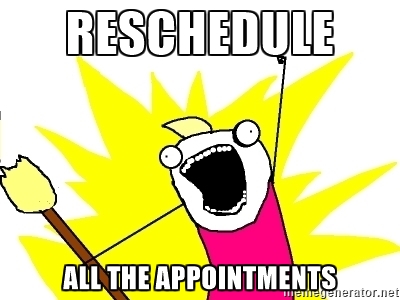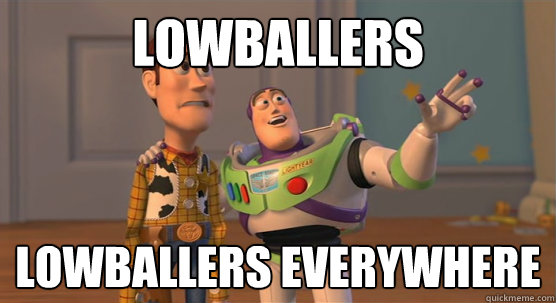8 Types Of Buyers You Shouldn’t Layan As An Online Seller
Don't waste your time with these people.
In this day and age, buying and selling have become an integral part of our lives and thankfully the Internet has made this process very easy
The process is no longer exclusive to businesses as it also extends to individuals that wish to buy or sell anything. Just last year, Facebook, the largest social network, introduced the 'sell' feature to better facilitate business processes.
While the Internet opens up opportunities for us to start a business or just to clear off your unused items at home, it also means that we are exposing ourselves to certain dangers of e-commerce.
Make no mistake, you have to take a certain risk as a buyer, especially when purchasing online, but you could also be a potential victim of scam as a seller. It may sound odd, but these cases are not unheard of and it's becoming very common due to low awareness.
So, if you're planning to sell-off your preloved items or start an online business, here are some things you should be aware of:
1. The buyer has a bad record
Try your best to deal with companies or individuals that you know by reputation or experience.
You may want to do a thorough background check on the person you're dealing with, so Google search and forums may come in handy. Besides that, community marketplaces such as Carousell allows you to view feedback left by other users on a specific profile. You could even view how a certain user fares as a 'buyer'.
Features like this is extremely useful to gauge how your potential buyer will be like, especially when you want to see if other sellers had a pleasant transaction with the buyer in the past.
Users with a bad track record are most likely to repeat their offences.
2. The buyer claims to be situated in another location
Example of a conversation between a buyer who claims to be from another country.
Image via Yvonne SamIf the potential buyer is located in a different state or district, you may want to reconsider selling off your items to him or her.
It's always good to insist on COD (cash on delivery) which means that payment is made on delivery rather than in advance. Anyone who claims to be interested in buying your items from another location and having you ship to them, especially if they are from another country, should raise suspicion as you might be exposing yourself to ingenuine buyers or even scammers.
A common example is when someone who claims to be a foreigner approaches you and expresses his or her interest in buying your item. Responses usually are swift and the individual would be very accommodating as a buyer just to convince you that he or she is dead serious about purchasing the item.
However, it is likely that you will face a "roadblock" ahead such as a failed or rejected bank transaction, depending on what is the modus operandi. In some instances, these buyers may also cheat you into making a payment to them.
3. The buyer doesn't want to hand you the cash first
If someone refuses to pay you first, especially when the method of delivery is via postage, then you should already be alarmed of a potential scam.
The general rule of thumb for any online dealing is to receive the money first before posting out your item.
Most sellers would post the goods after they see the money reflected in their account. Never take the risk to send out an item before receiving the payment.
It is also good to note that interbank transactions may take up to a few days, depending on the bank's standard operating procedures.
So, remember to always get your cash first, everything else comes later.
4. The buyer who cancels the scheduled appointment at the last minute
If you've fixed a specific time and location to meet your buyer and he or she backed out at the last minute, there are two possibilities:
1. They really had an emergency
2. They are really not interested in buying your item
Also, if the buyer is unwilling to meet you at a common point and suggests an area you are not familiar with, you should think twice about it.
It is also a good practice to bring along another person whenever you do a COD for an extra pair of eyes in case of any discrepancies.
5. The buyer who comes up with too many excuses
If the buyer displays certain signs of being dishonest like using a fake name or using a phone number that cannot be reached, these are signs that the buyer might not be very trustworthy.
If the buyer suddenly reschedules an appointment at the last minute to delay the purchase, you may want to rethink if it is wise to proceed with the deal.
If the buyer goes missing for a few days without replying whether he or she is still interested in buying the goods from you, maybe it's better to wait for another buyer.
At the end of the day, if you think that the buyer is not reliable, you may want to consider distancing yourself from these kinds of buyers rather than proceeding with the deal.
6. The buyer who bargains too much
As a seller, unless you are unaware of the market price, you would know how much your item is worth.
A 'lowballer' is someone who haggles and offers to buy your item at a price that is beyond the reasonable benchmark. You could be wasting a lot of time in the process of negotiating the price with lowballers, especially if these people are not serious in purchasing your item.
There are instances when a seller agrees to a price that is way below the market price, but even then, the buyer that made the offer cannot fulfil it because the individual is just "testing out the market".
7. The buyer wants you to reserve an item without paying any deposit
There are instances when a potential buyer wants you to reserve the goods for sale for a specific amount of time. However, the problem arises when he or she is not willing to pay a reasonable amount of deposit to secure the item.
It's entirely up to an individual whether they want to reserve the item without taking any deposit but people will usually stay away from such customers as there is a high chance that the buyer might call off the deal at the last minute.
The downside to this is the fact that you may potentially lose a genuine customer who was interested in buying your goods as you may have reserved it for a 'fake buyer'.
8. The buyer gives you multiple problems after the deal
On some occasions, you may face a buyer who has a lot of complaints after sales. These are not difficult customers, but problematic ones. It could happen for various reasons like how the purchase was an impulse buy and they want a refund, or even cases like they "mistakenly bought the wrong item".
As such, it is important that you made it clear and reach a mutual understanding earlier about the after sales services otherwise you may have to entertain his or her refund requests.
If you happen to have a lot of problems and you find yourself running out of luck when dealing with the problematic customer, perhaps offering a refund may be a quick solution.
As a seller, take the necessary steps to ensure that the items you sell are in the condition as promised, especially when it's a used item.
Always have a black-and-white agreement (in chat or your medium of communication) and take photographs of your goods to show the conditions of the items. These could be useful as proof in case the buyer tries to rip you off afterwards.
At the end of the day, the process of buying and selling could be really fulfilling...
...but always remember, if an offer sounds suspicious or too good to be true, it probably is.






